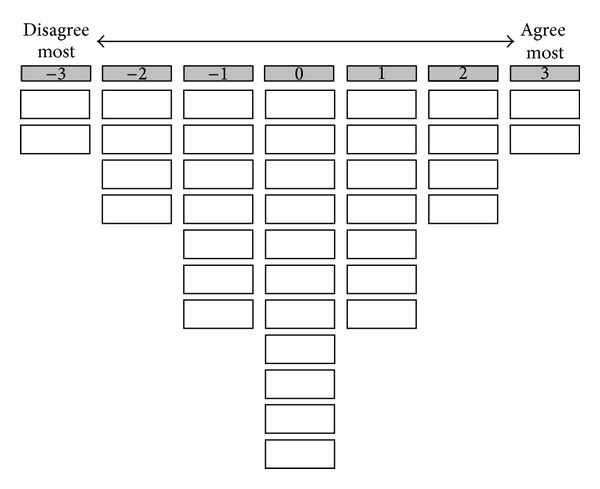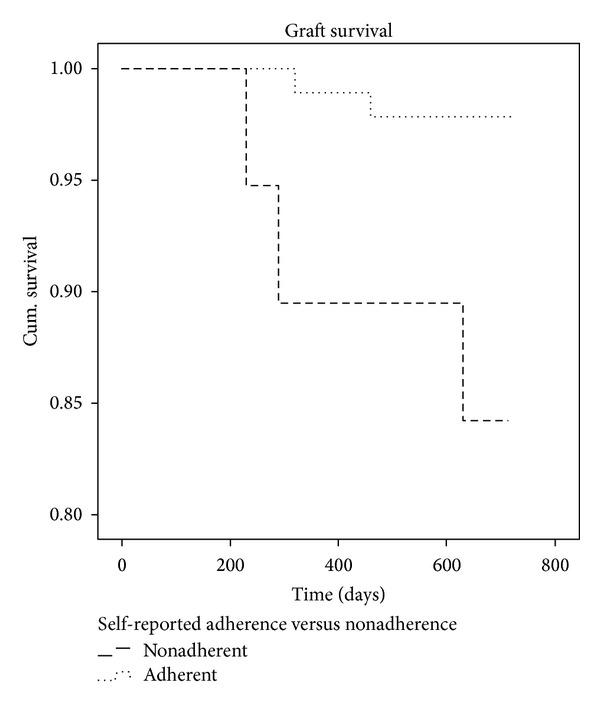Mirjam Tielen, Job van Exel, Mirjam Laging, Denise K Beck, Roshni Khemai, Teun van Gelder, Michiel G H Betjes, Willem Weimar, Emma K Massey
{"title":"Attitudes to medication after kidney transplantation and their association with medication adherence and graft survival: a 2-year follow-up study.","authors":"Mirjam Tielen, Job van Exel, Mirjam Laging, Denise K Beck, Roshni Khemai, Teun van Gelder, Michiel G H Betjes, Willem Weimar, Emma K Massey","doi":"10.1155/2014/675301","DOIUrl":null,"url":null,"abstract":"<p><p>Background. Nonadherence to medication is a common problem after kidney transplantation. The aim of this study was to explore attitudes towards medication, adherence, and the relationship with clinical outcomes. Method. Kidney recipients participated in a Q-methodological study 6 weeks after transplantation. As a measure of medication adherence, respondents completed the Basel Assessment of Adherence to Immunosuppressive Medications Scale (BAASIS(©)-interview). Moreover, the intrapatient variability in the pharmacokinetics of tacrolimus was calculated, which measures stability of drug intake. Data on graft survival was retrieved from patient records up to 2 years after transplantation. Results. 113 renal transplant recipients (19-75 years old) participated in the study. Results revealed three attitudes towards medication adherence-attitude 1: \"confident and accurate,\" attitude 2: \"concerned and vigilant,\" and attitude 3: \"appearance oriented and assertive.\" We found association of attitudes with intrapatient variability in pharmacokinetics of tacrolimus, but not with self-reported nonadherence or graft survival. However, self-reported nonadherence immediately after transplantation was associated with lower two-year graft survival. Conclusion. These preliminary findings suggest that nonadherence shortly after kidney transplantation may be a risk factor for lower graft survival in the years to follow. The attitudes to medication were not a risk factor. </p>","PeriodicalId":45795,"journal":{"name":"Journal of Transplantation","volume":"2014 ","pages":"675301"},"PeriodicalIF":2.2000,"publicationDate":"2014-01-01","publicationTypes":"Journal Article","fieldsOfStudy":null,"isOpenAccess":false,"openAccessPdf":"https://sci-hub-pdf.com/10.1155/2014/675301","citationCount":"72","resultStr":null,"platform":"Semanticscholar","paperid":null,"PeriodicalName":"Journal of Transplantation","FirstCategoryId":"1085","ListUrlMain":"https://doi.org/10.1155/2014/675301","RegionNum":0,"RegionCategory":null,"ArticlePicture":[],"TitleCN":null,"AbstractTextCN":null,"PMCID":null,"EPubDate":"2014/4/28 0:00:00","PubModel":"Epub","JCR":"Q3","JCRName":"SURGERY","Score":null,"Total":0}
引用次数: 72
Abstract
Background. Nonadherence to medication is a common problem after kidney transplantation. The aim of this study was to explore attitudes towards medication, adherence, and the relationship with clinical outcomes. Method. Kidney recipients participated in a Q-methodological study 6 weeks after transplantation. As a measure of medication adherence, respondents completed the Basel Assessment of Adherence to Immunosuppressive Medications Scale (BAASIS(©)-interview). Moreover, the intrapatient variability in the pharmacokinetics of tacrolimus was calculated, which measures stability of drug intake. Data on graft survival was retrieved from patient records up to 2 years after transplantation. Results. 113 renal transplant recipients (19-75 years old) participated in the study. Results revealed three attitudes towards medication adherence-attitude 1: "confident and accurate," attitude 2: "concerned and vigilant," and attitude 3: "appearance oriented and assertive." We found association of attitudes with intrapatient variability in pharmacokinetics of tacrolimus, but not with self-reported nonadherence or graft survival. However, self-reported nonadherence immediately after transplantation was associated with lower two-year graft survival. Conclusion. These preliminary findings suggest that nonadherence shortly after kidney transplantation may be a risk factor for lower graft survival in the years to follow. The attitudes to medication were not a risk factor.


肾移植术后用药态度及其与药物依从性和移植物存活的关系:一项2年随访研究。
背景。不坚持服药是肾移植后的常见问题。本研究的目的是探讨对药物的态度、依从性以及与临床结果的关系。方法。肾受者在移植后6周参加q方法学研究。作为药物依从性的衡量标准,受访者完成了巴塞尔免疫抑制药物依从性评估量表(basasis(©)-访谈)。此外,我们还计算了他克莫司在患者体内的药代动力学变异性,以衡量药物摄入的稳定性。从移植后2年的患者记录中检索移植物存活数据。结果:113例肾移植受者(19-75岁)参与了研究。结果显示了人们对药物依从性的三种态度:态度1:“自信、准确”,态度2:“关心、警惕”,态度3:“注重外表、果断”。我们发现态度与他克莫司的病人体内药代动力学变异性有关,但与自我报告的不依从或移植物存活无关。然而,移植后立即自我报告的不依从与较低的两年移植存活率相关。结论。这些初步研究结果表明,肾移植后不久的不依从可能是随后几年移植物存活率较低的一个危险因素。对药物的态度不是一个危险因素。
本文章由计算机程序翻译,如有差异,请以英文原文为准。



 求助内容:
求助内容: 应助结果提醒方式:
应助结果提醒方式:


